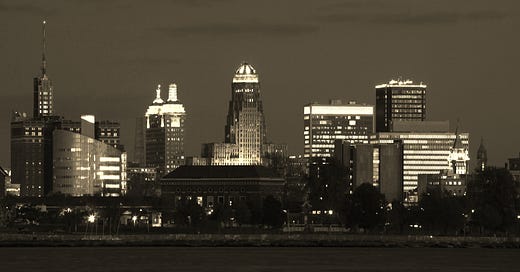The Buffalo, New York city center as darkness falls. Courtesy of Shutterstock.
Buffalo, NY
Yesterday, another tragedy overcame the nation.
A boy drove three hours to a neighborhood in Buffalo, New York, from his town in the southern tier of the state.
There he shot and injured 13 people, killing 10 souls. Most of the victims were African Americans. He was inspired by a manifesto that he wrote which features white nationalist theories. The main conspiracy, The Great Replacement, has been trafficked by congressional members of the Republican Party and popular right-wing television hosts like Tucker Carlson on Fox News.
This was an obscene event that unfortunately many saw coming.
Aaron Rupar, the author of Public Notice, has tracked when Republican politicians have cited the Great Replacement Theory:

Nikki McCann Ramírez at Media Matters for America tracks Tucker Carlson’s show:

Fuel
Backlash fuel is a natural energy source in global politics.
Democrats and Republicans use it. People will react negatively to a contemporary status quo, so naturally, the opposition force exploits that dismay for political gains.
However, there is a limit.
Today, The New York Times explains the Republican Party’s exploitation of this theory as “refashioned”:
But replacement theory, once confined to the digital fever swamps of Reddit message boards and semi-obscure white nationalist sites, has gone mainstream. In sometimes more muted forms, the fear it crystallizes — of a future America in which white people are no longer the numerical majority — has become a potent force in conservative media and politics, where the theory has been borrowed and remixed to attract audiences, retweets and small-dollar donations.
By his own account, the Buffalo suspect, Payton S. Gendron, followed a lonelier path to radicalization, immersing himself in replacement theory and other kinds of racist and antisemitic content easily found on internet forums, and casting Black Americans, like Hispanic immigrants, as “replacers” of white Americans. Yet in recent months, versions of the same ideas, sanded down and shorn of explicitly anti-Black and antisemitic themes, have become commonplace in the Republican Party — spoken aloud at congressional hearings, echoed in Republican campaign advertisements and embraced by a growing array of right-wing candidates and media personalities.
Charlie Sykes notes the transformation of Elise Stefanik in The Bulwark’s Morning Shots newsletter. Stefanik is the third-ranking GOP member in the House Republican Conference. She aided in the ouster of Liz Cheney who admirably wanted to seek the truth about the events of January 6, 2021.
After this weekend’s horrific events in Buffalo, critics reminded us that the one-time Paul Ryan acolyte had joined other right-wing voices pushing the Great Replacement Theory, putting out social media posts that declared: “Radical Democrats are planning their most aggressive move yet: a PERMANENT ELECTION INSURRECTION. Their plan to grant amnesty to 11 MILLION illegal immigrants will overthrow our current electorate and create a permanent liberal majority in Washington.”
That drew a sharp rebuke last September from the Albany Times Union, which asked: “How low, Ms. Stefanik?”
Stefanik, however, is hardly alone. And that has consequences.
Nightmare Fuel
There really is nothing new about backlash fuel. It is a technique that has been utilized since the ancient world. In America, backlash fuel has been tied to multiculturalism since the creation of the nation.
Many parts of the Republican ecosystem have been using the backlash from President Barack Obama’s election and a changing demographic makeup to win elections in the modern era. They naturally did this because much of the modern party’s incentive structures have been led astray by a dark elitism that refused to police the fringe corners of the Republican orbit. That wing grew and left an opening for President Donald Trump’s American carnage.
I have written about this.
Clare Malone also has written about it in her article, “The Republican Choice”, for FiveThirtyEight:
From that principle flows all manner of Republican strategy. Sometimes the efforts are less legalistic and more shock jock — in 2016, the Trump campaign described “suppression efforts” aimed at Black voters, which included placing ads on radio stations popular with African Americans that played up Hillary Clinton’s 1996 comments about “superpredators.” More often, though, these moves by Republicans involve accusations of widespread voter fraud, battles over voter registration, and court challenges to laws meant to protect the franchise of America’s minorities. Talk of “election integrity” by the Grand Old Party is inextricably intertwined with its modern history of pandering to racist elements of American life; any attempt to disentangle these stories and tell them separately is disingenuous, even if it angers partisans.
American Tragedy
It is truly tragic what has happened.
Some Republicans performatively use white nationalist conspiracies to peddle fear and activate base voters. It is how we get to the racially motivated shootings of this past weekend and beyond.
In fairness, Democrats can also overplay our nation’s blatant and deep-seated racial inequality to activate voters while overlooking how America has crested into a multicultural force. That can also be alienating and polarizing when it overshadows a more compassionate conversation that gives less agency to individuals and more spotlight to systems that have thankfully been designed to change and adapt.
Still, there is no equivalency here. That is not being argued.
But, since the political parties are attached to people’s personal identities today (for a multitude of reasons studied by political scientists) - it is safe to assume a lot of people feel like calling Republicans racist is also unfairly calling them a racist.
This does have to be reckoned with before it unleashes more darkness that people are willing to overlook out of spite and grievance.
TLDR: This weekend the right-wing demagoguery once again went too far.







